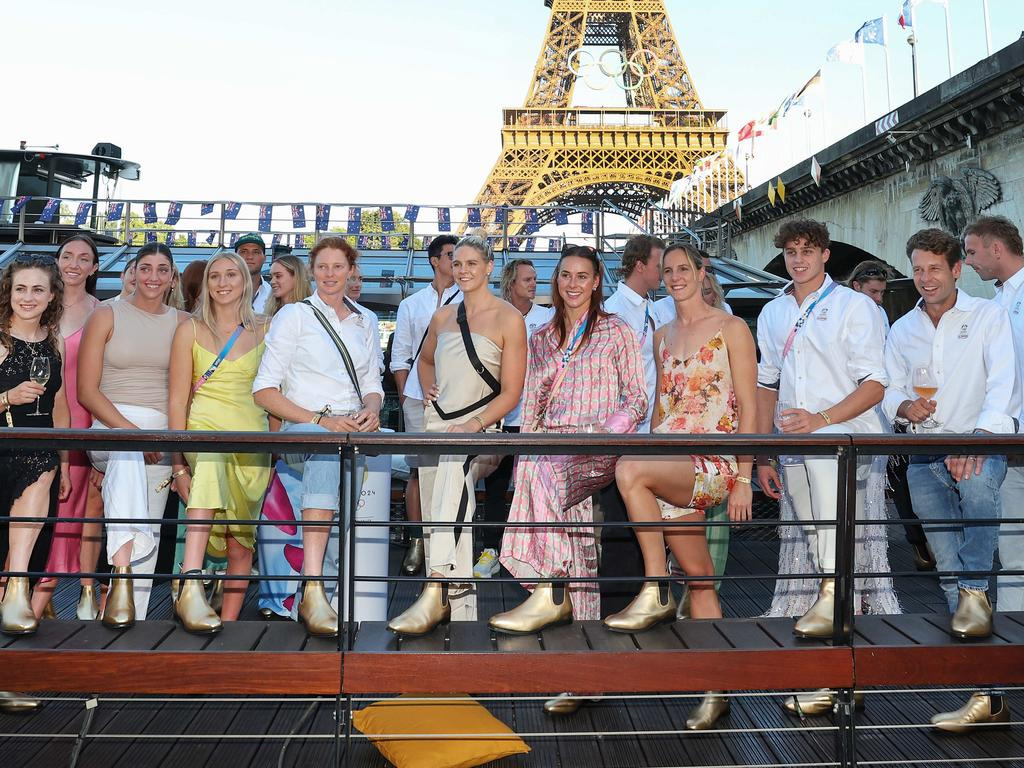
Article by Shannon Gill, courtesy of The Australian.
Socceroos great Craig Foster has accused Australian Olympic heroes of being complicit in global ‘sportswashing’ and aiding planet pollution via ‘dirty money’ sponsorship deals with Gina Rinehart’s Hancock Prospecting.
Activist Foster is spearheading a global campaign to draw attention to sports sponsorship by oil and gas companies, and called out the Australian Olympic Committee in his foreword to the New Weather Institute report released today.
“Mining company Hancock Prospecting’s sponsorship of the Australian Olympic Team, Swimming Australia and Rowing Australia are well known and lend the credibility of great athletes to a company seeking to increase our fossil fuel emissions,” Foster wrote.
Foster has some facts wrong as Swimming Australia do not currently hold a sponsorship arrangement with the company.
But Rinehart directly funds Australian swimmers via Swimming Queensland while many Australian Olympic athletes expressed gratitude to Rinehart in the wake of the Paris Games for making their Olympic dream financially sustainable.

The mining magnate even hosted Olympic swimming and rowing medallists from Paris on a lavish River Seine cruise during the Games and shares generous gifts with athletes each year at private functions.
It is claimed Hancock Prospecting funded up to a quarter of the athletes on the Paris Olympic team via partnerships in sports across swimming, rowing, artistic swimming and beach volleyball.
While Foster highlighted the Olympic relationship in his report, the major focus was on the billions pocketed in other sports around the world.
The global report names motorsport and football as the worst pollution beneficiaries, pocketing an estimated $2.186 billion and $994.5 million respectively across 99 current deals with gas and oil companies attempting to soften up their image. Rugby Union and golf are next on the list.
“It’s sobering, though unsurprising, to see that my own sport, football, leads the league of shame for fossil fuel sponsorship,” Foster said.
While the AFL is a domestic sport the New Weather Institute says it belies its one country-presence on sportswashing.
The report claims that Australian Rules football will pocket in the vicinity of $24 million from sponsorship deals across the AFL and its clubs. This ranks ahead of global sports like tennis and cricket.
Fremantle, Port Adelaide, Carlton, Brisbane, Hawthorn and West Coast hold deals with companies the report claims as polluters while the league itself has a partnership with Shell that the report estimates at $1.1 million annually. Most of those partnerships relate to everyday automobile petrol use.
Foster has warned that Australia, given its recent history of bushfire and flood climate emergencies, needs to reckon with the sportswashing issues ahead of the 2032 Olympics and Paralympics in Brisbane.
“Australians are characteristically eager (for Brisbane 2032), for sport is in our DNA,” Foster said.
“But for too long, the uncomfortable questions regarding the oil and gas sponsors who are undermining our safe future and that of sport have been ignored.”
“We, as athletes, fans, and custodians of sport, must address them. There is no place for fossil fuel sponsors in sport.”
For all the arguments posed by the report, titled Dirty Money: How Fossil Fuel Sponsors are Polluting Sport, trying to find replacements in the Australian commercial market for products that most Australians use would cause significant headaches for sports leagues and clubs.
If the Australian Olympic Committee was to heed that call it would be ditching one of its biggest partners ahead of an eight-year run to a home Olympics.
Future legislative restrictions on sports gambling advertising and sponsorship will further squeeze the commercial sports market in this country.
Hancock Prospecting defended its investment in sport.
“Hancock Prospecting has invested significantly in Australia to provide top agricultural produce for Aussies to enjoy, with millions invested to better care for animals, and iron ore without which Australia and the world could not build machinery, machinery needed for farms and factories, indeed needed for everything from cars, phones, and multi-story hospitals, to sports stadiums and renewable energy,” a spokesperson for the company said.
“Our more recent joint ventures into natural gas provide a critical fuel supply to manufacturers and keeps the lights on in Australia and for our allies, without which Australians would be facing an energy crisis. We have built a private company our employees and ambassadors can be proud of, and one that contributes hugely to our country.”
Former Olympic rower and now Rowing Australia CEO Sarah Cook said the sponsorship is vital to her sport.
“We’re very grateful for the support of Mrs. Rinehart and Hancock Prospecting,” she said.
“It means a great deal to Rowing Australia and our athletes, and it predominantly goes towards directly supporting our athletes to be able to train full-time to represent their country.”
The report estimates that sport will rake in $5.6 billion globally from the industry via its 205 active deals.
That figure does not include the state-sponsored activities of the Kingdom of Saudi Arabia and other gulf states in funding sporting events that are economically fuelled by oil. The report estimates that $180 billion of the $229 billion spent on staging the 2022 FIFA World Cup came from fossil fuels revenue.
The state-owned Saudi Aramco is the world’s most profitable company and the biggest fossil fuel sponsor of sport. It tips in $314.1 million annually, including an eye-watering estimated $100 million per year for a global partnership with FIFA. It also holds major deals with Formula 1 and Aston Martin Racing.
Other big fossil fuel sponsors are Shell (142.4m), TotalEnergies (62.4m annually) and Ineos ($113m).
In addition to its AFL deal, Shell holds sponsorships with the Ferrari F1 team, the NFL’s New Orleans Saints, and the NBA’s Sacramento Kings and New Orleans Pelicans.
Total Energies is a major partner of Africa Cup of Nations football and was a sponsor of the 2023 Rugby World Cup.
Petrochemical company Ineos is the naming-rights partner of Ineos Cycling, holds sponsorships with the Mercedes F1 team, New Zealand All Blacks and Tottenham Hotspur, and is a shareholder in Manchester United.















